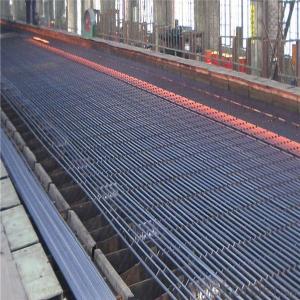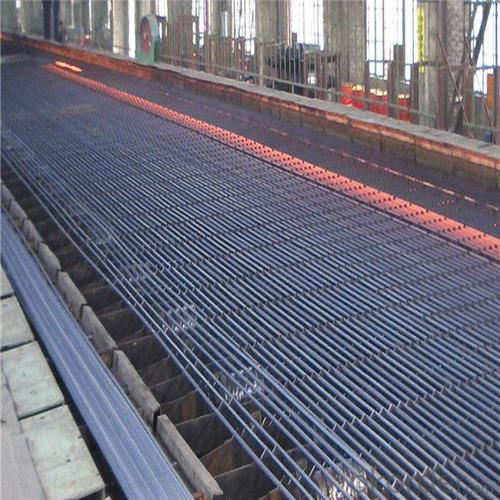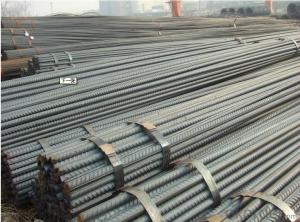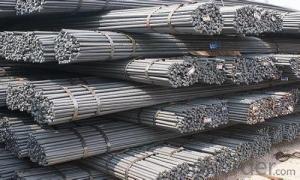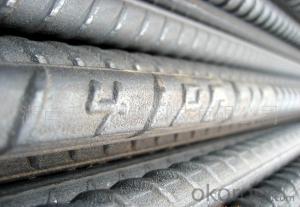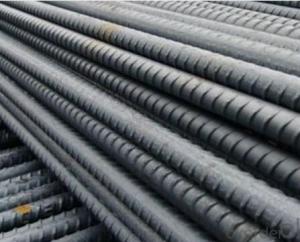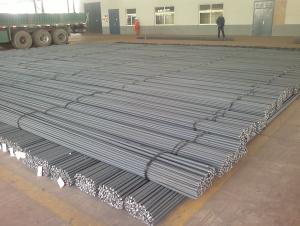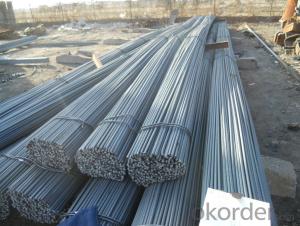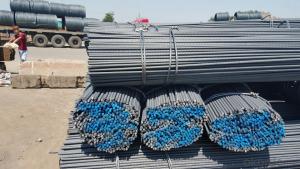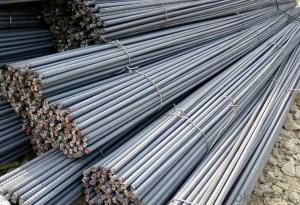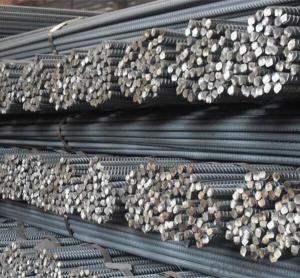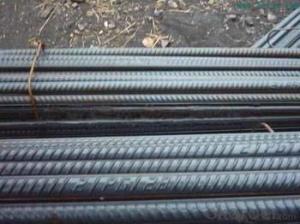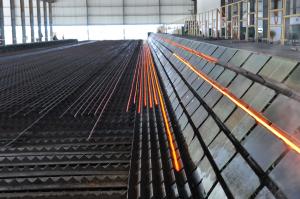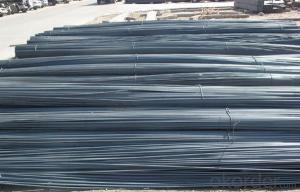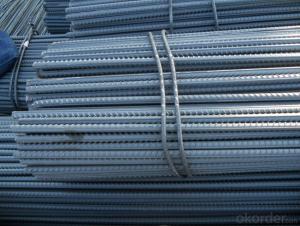High Tensile Deformed Steel Rebar Factory Price
- Loading Port:
- Qingdao
- Payment Terms:
- TT OR LC
- Min Order Qty:
- 100 m.t.
- Supply Capability:
- 18000 m.t./month
OKorder Service Pledge
OKorder Financial Service
You Might Also Like
Specification
Most grades of steel used in rebar cannot accept welding; such as, to adjacent steel plates or as means to bind
single pieces of rebar together. However, special grades of rebar steel and welding rods make welding by expert
welders possible.
To prevent workers from accidentally impaling themselves, the protruding ends of steel rebar are often bent over or
covered with special plastic "mushroom" caps.
Our Advantage: High quality steel products from 1 class mills in China
Reasonable price
Professionalism of the products
On-time delivery
Complete documents and certificates
Sincere service to meet our clients' requirements
Product Description :
Chemical composition (%): | Steel | C | Si | Mn | P | S | Ceq | ||||
HRB335 |
0.25 |
0.80 |
1.60 |
0.045 |
0.045 | 0.52 | |||||
HRB400 | 0.54 | ||||||||||
HRB500 | 0.55 | ||||||||||
Mechanical properties | Steel | Rel/ MPa | Rm/ MPa | A/ % | Agt/ % | ||||||
≥ | |||||||||||
HRB335 | 335 | 455 | 17 |
7.5 | |||||||
HRB400 | 400 | 540 | 16 | ||||||||
HRB500 | 500 | 630 | 15 | ||||||||
Package: | Standard export packing or as customer's request | ||||||||||
Application: | Construction, building, bridge, road. ect | ||||||||||
Payment terms | 1).100% irrevocable L/C at sight. | ||||||||||
Delivery time | 15-30 days after receipt of L/C or deposit by T/T | ||||||||||
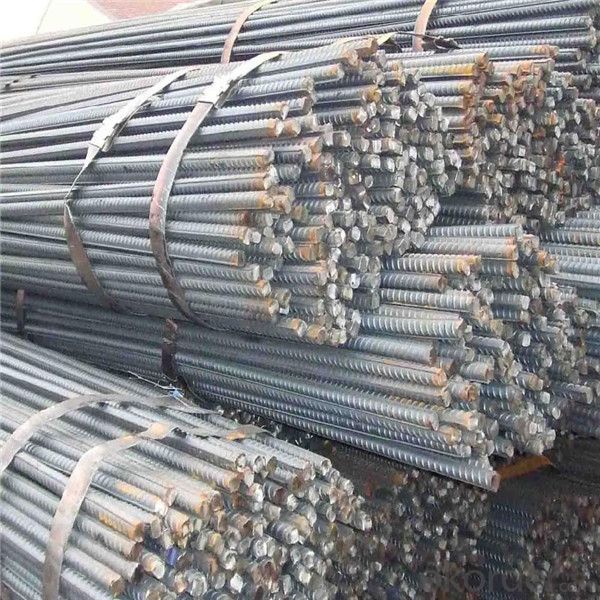
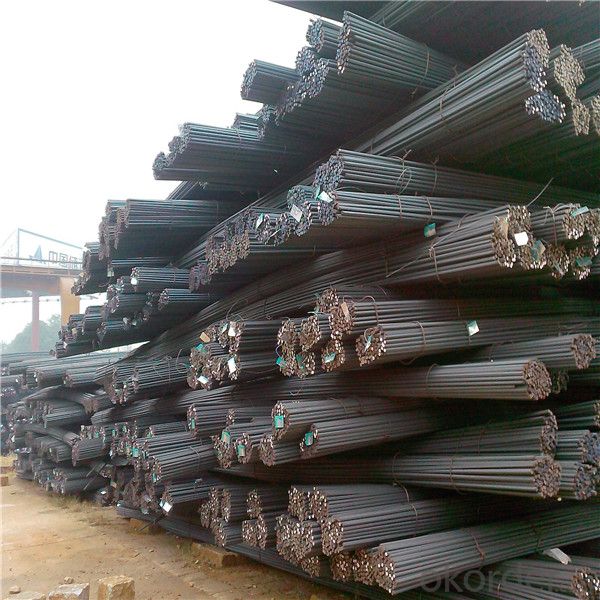
Packing:
In bundles, each bundle weight 3.5 tons. Load by container or by bulk verssel.
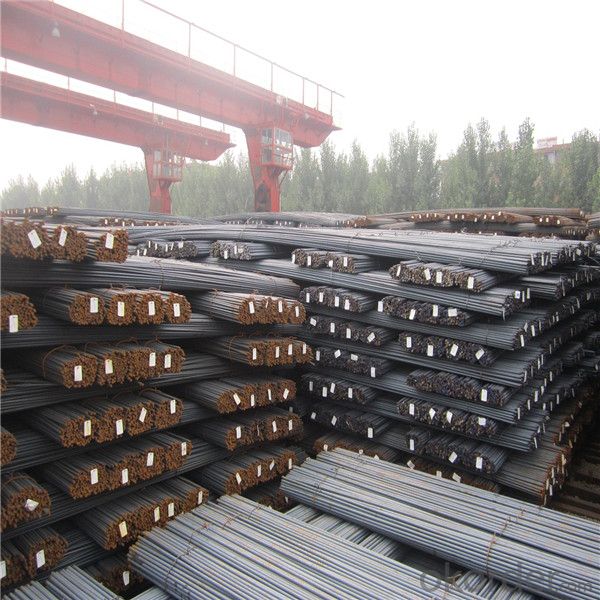
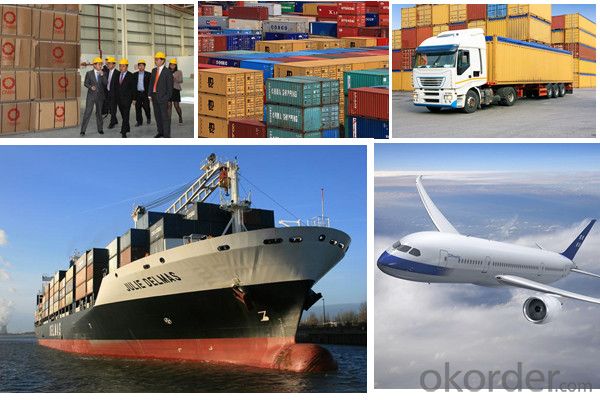
Our service
(1) We cooperate with famous factories with advanced equipment and well trained workers.
(2) We can provide factory price with trading company service.
(3) We continuously work on the improvement of our processes, guaranteeing consistently high standards
of quality to keep none compensation.
(4) We guarantee 24 hours response and 48 hours solution providing service.
(5) We accept small order quantity before formal cooperation.
(6) We deliver the agreed quality at the agreed time, reacting to changes in customer wishes in a flexible way.
(7) Due to our volume and selling power, we have excellent freight rates with shipping lines.
(8) We strive to always be fair and honest in our dealings with customers.
(9) We strive to work together with customers to achieve much more than we can achieve alone.
(10) Through our passion and commitment we aim to be a market leader in all our key markets. To maintain
our position as market leader we must continue to add value in all that we do.
FAQ:
1.Q: What's your MOQ(minimum order quantity)?
A: One full container, mixed acceptable .
2. Q: What's your packing methods?
A: Packed in bundle or bulk ..
3. Q: How can I buy CNBM products in my country?
A:Please send us an inquiry or email ,we will reply to you if there is distributor in your country
4. Q: Can we visit your factory?
A: Warmly welcome. Once we have your schedule, we will arrange the professional sales team to follow up your case.
5. Q: How long does it take to get the product if i place an order?
A:With the process of your requirements,we will pack and deliver in 3-7 days. If it is by sea shipment,it will take 15-45 days depending on different locations
- Q: Can steel rebars be used in seismic-resistant construction?
- Yes, steel rebars can be used in seismic-resistant construction. Steel rebars are commonly used in reinforced concrete structures to enhance their strength and durability, making them suitable for withstanding seismic forces. By reinforcing the concrete with steel rebars, the structure becomes more resistant to the lateral and vertical movements caused by earthquakes, thereby improving the building's seismic performance.
- Q: Are steel rebars suitable for reinforcement in parking garages?
- Yes, steel rebars are suitable for reinforcement in parking garages. They are commonly used due to their high tensile strength, durability, and ability to withstand heavy loads. Additionally, steel rebars provide structural stability and help prevent cracking or collapsing of the concrete in parking garages, making them an ideal choice for reinforcement.
- Q: What are the benefits of using stainless steel rebars?
- There are several benefits of using stainless steel rebars in construction projects. Firstly, stainless steel rebars offer excellent corrosion resistance. This is particularly important in environments with high humidity, coastal areas, or projects where the concrete will be exposed to water or chemicals. Unlike traditional carbon steel rebars, stainless steel rebars do not rust or corrode easily, ensuring the long-term integrity and durability of the structure. Secondly, stainless steel rebars have a higher tensile strength compared to carbon steel rebars. This means that they can withstand greater forces and stresses without deforming or breaking. This makes stainless steel rebars ideal for structures that require high load-bearing capacity, such as bridges, parking garages, and high-rise buildings. Furthermore, stainless steel rebars have a low thermal expansion coefficient. This means that they do not expand or contract significantly with changes in temperature. This property helps to minimize cracking and structural damage due to thermal stresses, ensuring the longevity and stability of the concrete structure. In addition to their mechanical properties, stainless steel rebars are also aesthetically pleasing. With their sleek and shiny appearance, stainless steel rebars can enhance the visual appeal of architectural elements such as exposed concrete walls or features in bridges and buildings. Lastly, stainless steel rebars are environmentally friendly. They are 100% recyclable, making them a sustainable choice for construction projects. By using stainless steel rebars, builders and engineers can contribute to reducing the carbon footprint and promoting a greener construction industry. Overall, the benefits of using stainless steel rebars include superior corrosion resistance, high tensile strength, low thermal expansion, aesthetic appeal, and environmental sustainability. These advantages make stainless steel rebars a preferred choice for various construction applications, providing long-lasting and reliable reinforcement for concrete structures.
- Q: Can steel rebars be used in underground construction projects?
- Yes, steel rebars can be used in underground construction projects. Steel rebars are commonly used for reinforcement in concrete structures, including those built underground. They provide strength and durability to the construction, making them suitable for various underground applications such as tunnels, basements, and underground parking structures.
- Q: How are steel rebars connected or joined together during construction?
- During construction, there are several methods and techniques for connecting steel rebars. One common method is to overlap the rebars and tie them together with steel wire, a process known as rebar tying or wire tying. To ensure a strong and secure connection, the rebars are overlapped at a length typically 40 to 60 times the diameter of the rebars. This overlapping length allows for load transfer and structural integrity. Once properly overlapped, steel wire is tightly wrapped around the intersection point to hold the rebars together. Another method is to use mechanical couplers, which are pre-fabricated devices that join two rebars together. These couplers provide a threaded connection, allowing for a more precise and efficient joining process. The rebars are inserted into the couplers and tightened using a wrench or appropriate tool. In larger construction projects, welding is also used to connect rebars. This involves melting the rebars at the intersection point and fusing them together with heat and pressure. Welding provides a strong and permanent connection but requires skilled labor and safety precautions. In some cases, rebars can be connected using epoxy bonding. This involves applying adhesive to the rebars' surface and pressing them together. The epoxy acts as a bonding agent, creating a durable connection. The method of connecting rebars depends on factors like rebars' size, project requirements, and construction techniques. It's important to follow industry standards and guidelines to ensure proper connection and integrity, as rebars play a critical role in reinforcing concrete structures.
- Q: Can steel rebars be used in sound barrier walls?
- Indeed, sound barrier walls can employ steel rebars. These rebars are regularly employed in the construction of reinforced concrete structures, such as sound barrier walls. They furnish the walls with resilience and longevity, guaranteeing their ability to endure the pressures exerted upon them by wind, weather, and impacts. Moreover, steel rebars aid in fortifying the structural integrity of the sound barrier walls, rendering them more impervious to vibrations and the transmission of noise. Consequently, steel rebars are a fitting and frequently utilized material in the construction of sound barrier walls.
- Q: Can steel rebars be used in modular bridges?
- Yes, steel rebars can be used in modular bridges. Steel rebars are commonly used in the construction of bridges due to their strength, durability, and ability to handle heavy loads. They provide reinforcement to the concrete components of the bridge, ensuring its structural integrity. In modular bridge construction, steel rebars are often incorporated into precast concrete elements, allowing for efficient and cost-effective assembly of the bridge modules.
- Q: How to judge the quality of thread steel?
- Sampling sample. Do tensile, bending, and impact tests.
- Q: Can steel rebars be used in retaining walls?
- Retaining walls can indeed utilize steel rebars. These rebars, also referred to as reinforcing bars, are frequently employed in retaining walls to enhance their strength and reinforcement. Typically, the rebars are embedded in the concrete or masonry structure of the retaining wall, thereby bolstering its structural integrity and fortifying it against forces like soil pressure. By incorporating steel rebars, retaining walls become resistant to cracking, shifting, or collapsing, providing a trustworthy and long-lasting solution for soil retention and erosion prevention.
- Q: What is the typical cost of steel rebars per ton?
- The typical cost of steel rebars per ton can vary depending on several factors such as the grade of the steel, market conditions, and location. However, as of 2021, the average cost of steel rebars ranges from $450 to $700 per ton.
Send your message to us
High Tensile Deformed Steel Rebar Factory Price
- Loading Port:
- Qingdao
- Payment Terms:
- TT OR LC
- Min Order Qty:
- 100 m.t.
- Supply Capability:
- 18000 m.t./month
OKorder Service Pledge
OKorder Financial Service
Similar products
Hot products
Hot Searches
Related keywords
